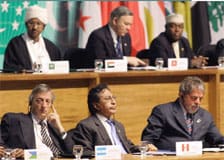Brazil

|
|
|
As the Brazilian central bank hikes the benchmark lending rate to curb inflation, resulting high interest rates are prompting a streak of IPOs on the So Paulo stock exchange (Bovespa), as corporates shun loans to raise financing through equity issuance.
Companies have raised more than $1 billion through IPOs over the past year, with the boom in issuance being fueled by institutional investors looking to reduce their exposure to government debt instruments by diversifying into stocks. Investors have been encouraged by strong first-quarter corporate earnings that continue to point to the country’s economic recovery, with the IMF predicting in April that the Brazilian economy will grow another 3.7% in 2005.
Bradesco, Brazil’s largest private bank, doubled its net income during the first quarter to $490 million, prompted by a 22% year-on-year rise in loan revenues. Itausa, whose subsidiaries include Banco Ita, reported a 37% year-on-year rise in net profits to $531 million. Gol, a no-frills airline, posted a 64% year-on-year rise in profits to $45 million, while Gerdau, Brazil’s largest steelmaker, saw profits soar by 90% to $399 million. The outlook for second-quarter earnings remains positive.
Nevertheless, with the central bank pushing the benchmark lending rate to 19.5% and oil prices remaining high, there are concerns that the country’s recovery could grind to a halt. Private sector economists have revised their inflation forecasts to 6.15% for the year, compared with earlier predictions of 5.68%. Industrial output grew by a meager 1.7% in March, as consumer demand is beginning to ease. A strengthened currency is also threatening to curb export production.
In a move to reduce Latin America’s dependence on investment and trade with the US and EU, Brazilian President Luiz Incio Lula da Silva hosted an Arab/Latin-American summit in Brasilia in May. The meeting also appears to be part of his strategy to take a regional leadership role, including his support of a Latin American integration scheme that competes with the US-led Free Trade Area of the Americas (FTAA).
Antonio Guerrero



